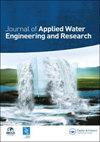改性壳聚糖回收甘薯淀粉废水中的蛋白质
IF 1.6
Q4 WATER RESOURCES
Journal of Applied Water Engineering and Research
Pub Date : 2022-03-08
DOI:10.1080/23249676.2022.2031321
引用次数: 0
摘要
本研究报道了一种有效的方法来探索改性壳聚糖在从甘薯淀粉废水中回收蛋白质中的重要作用。利用傅立叶变换红外光谱(FT-IR)、能量色散X射线分析(EDX)、偏振光学显微镜(POM)和扫描电子显微镜(SEM)对改性壳聚糖进行了表征。在蛋白质回收过程中监测参数,如搅拌时间、壳聚糖剂量、初始pH和沉淀时间。同时,利用Box-Behnken设计(BBD)建立了二阶多项式模型。绘制了三维响应面轮廓图,以了解工艺参数对蛋白质回收的交互影响。通过使用期望的函数方法来确定最佳操作条件。在这些最佳条件下,蛋白质回收率达到95%。建立了一个基于人工神经网络的蛋白质回收模拟模型。电泳分析表明,回收的蛋白质可以作为家畜饲料的原料。本文章由计算机程序翻译,如有差异,请以英文原文为准。
Protein recovery from sweet potato starch wastewater using modified chitosan
This study reports an effective method to explore the significant role of modified chitosan in recovering a protein from starch wastewater of sweet potato. Fourier transform infrared (FT-IR) spectroscopy, energy dispersive X-ray analysis (EDX), polarizing optical microscopy (POM), and scanning electron microscope analysis (SEM) are used to characterize modified chitosan. Parameters, such as agitation time, chitosan dose, initial pH, and settling time, are monitored over the protein recovery process. Also, the second-order polynomial model was developed with Box Behnken design (BBD). 3-D response surface contour graphs are plotted to learn about the interactive effects of process parameters on protein recovery. The optimum operating conditions are determined by using the desired function methodology. Under these optimal conditions, 95% of the protein was recovered. An artificial neural network (ANN)-based model was developed for simulating protein recovery. Electrophoresis analysis has shown that recovered protein can be used as livestock feed ingredients.
求助全文
通过发布文献求助,成功后即可免费获取论文全文。
去求助
来源期刊

Journal of Applied Water Engineering and Research
WATER RESOURCES-
CiteScore
2.90
自引率
16.70%
发文量
31
期刊介绍:
JAWER’s paradigm-changing (online only) articles provide directly applicable solutions to water engineering problems within the whole hydrosphere (rivers, lakes groundwater, estuaries, coastal and marine waters) covering areas such as: integrated water resources management and catchment hydraulics hydraulic machinery and structures hydraulics applied to water supply, treatment and drainage systems (including outfalls) water quality, security and governance in an engineering context environmental monitoring maritime hydraulics ecohydraulics flood risk modelling and management water related hazards desalination and re-use.
 求助内容:
求助内容: 应助结果提醒方式:
应助结果提醒方式:


